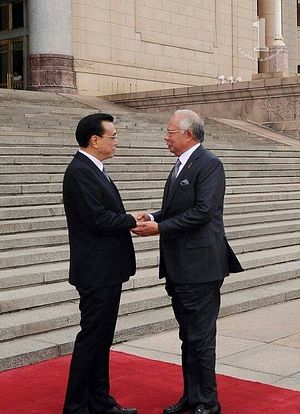Malaysian Prime Minister Najib Razak is in China this week for a six day visit. He began his visit in Xi’an before arriving in Beijing on Wednesday for talks with central government figures, including Chinese Premier Li Keqiang and President Xi Jinping. Despite a positive tone, the state visit could not help but be overshadowed by the disheartening news that searchers are no closer to finding Malaysia Airlines Flight 370, which disappeared on March 8 and is presumed to have crashed in the Indian Ocean.
Najib’s visit is not a typical diplomatic tour. He is in China to celebrate the 40th anniversary of China-Malaysia diplomatic relations, which were reestablished on May 31, 1974 under Najib’s father, then-Prime Minister Tun Abdul Razak. The mood is celebratory, with the highlight to be a special commemorative event on Saturday, May 31, attended by both Li and Najib.
China and Malaysia both emphasized the positive in the visit. “China values its relationship with Malaysia,” Foreign Ministry spokesman Qin Gang said in a press conference. Qin added that China hope to discuss “deepening bilateral cooperation and enhancing coordination between the two countries on major regional issues” during Najib’s visit.
Malaysian news outlets were more specific, with the New Strait Times reporting that Li and Najib signed a memorandum of understanding on “defense science, technology and industry,” as well as agreeing to bolster economic and trade ties. The two countries will try to increase trade from the current level of $106 billion a year to $160 billion by 2017. They will also seek to expand their cooperation in regional fora, including ASEAN summits.
Yet despite the goodwill on display, the visit could not escape being affected by the news that the search for MH370 had turned up empty. In April, investigators had been encouraged by the reception of electronic pings thought to be from MH370’s black box. This led to the search being centered around an 850 square kilometer area of the Indian Ocean. On Thursday, the same day as Najib’s meetings with Li, the Joint Agency Coordination Centre, the body spearheading the search, announced that this area “can now be discounted as the final resting place of MH370.” Nearly three months after MH370 disappeared, there’s little to show for an international search effort.
The fruitless search hits two countries especially hard: Malaysia, which is ultimately responsible for coordinating the search efforts, and China, which had over 150 citizens on board the lost plane. The lack of progress in the search has sparked criticisms from the Chinese government and angry protests from Chinese family members of the passengers.
Continuing frustrations over the situation spilled over into Najib’s visit. Premier Li Keqiang urged Najib to “come up with a new search plan for the jet at an early date, and take the investigation seriously,” according to Xinhua. Li also asked Najib to handle appeals from family members in order to “properly settle the issue.” Najib promised to find “solutions and answers to what really happened to this aircraft and do whatever we can to help and soothe the feelings of the next of kin.”
Najib was quick to assure Malaysian journalists that MH370 would not have a negative impact on China-Malaysia relations, but it remains an issue of concern. In fact, Xinhua’s story on the Li-Najib meeting had Li’s comments on MH370 as the lede. Meanwhile, Chinese family members remain angry at Najib’s government. The son of one passenger interviewed by Voice of America said many of the relatives were frustrated that Najib refused to meet with them during his time in China. Officially, China and Malaysia are in a celebratory mood with the 40th anniversary of diplomatic relations coming up, but in public opinion and the media, Flight 370 still looms over the relationship.

































